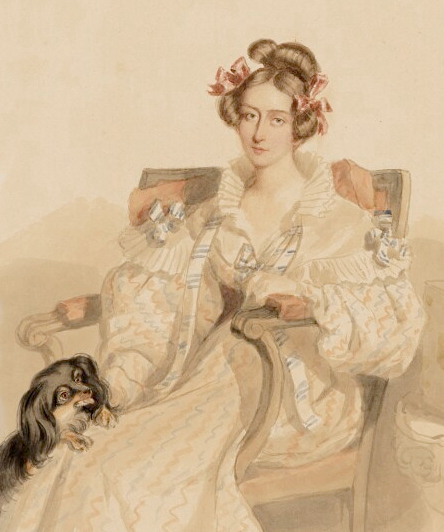by Pamela Toler
Allow me to introduce Emily Eden–aristocratic spinster, political hostess, accomplished painter, and talented novelist.

I first discovered Emily Eden through her connection to India. Her brother George Eden, 1st Earl of Auckland, was appointed Governor-General of India in 1835. Emily accompanied him to India and served as his Burra Lady Sahib (the rough equivalent of an American First Lady) for the six years of his tenure.*
For the first twenty months of their stay, the Edens stayed in Calcutta, then the capital of British India. Emily was miserable. She didn’t like India–or more accurately, she didn’t like Anglo-Indian society in Calcutta, which she viewed with all the snobbery of an aristocrat accustomed to moving in the highest political circles. She felt herself exiled in what she described as a “second-rate society”. Things got better when Emily accompanied her brother on a two-year-long tour of the country. Her diary and letters, published in 1866 as Up The Country, offer a witty and carefully observed account of a specific moment in Indian history as seen from a very specific viewpoint. I read Up The Country for my academic work, but found it an absolute pleasure.
Several years later, I was delighted to stumble across two novels by Eden: The Semi-Attached Couple and The Semi-Detached House. Although Eden’s experience of the world was much broader than Austen’s, their novels are similar in scale. Instead of writing about her experience of India or political London, Eden wrote comedies of manners that drew on the same social mores and concerns as Austen’s novels, though both their author and her characters live higher up the social ladder than Austen. Eden observes her own society with the same sharp-eyed wit that she brought to India.
I don’t claim that Eden is Austen’s equal. (No one who writes the kind of thing Austen writes comes even close.) Her novels are a good read in the same general vein by an author with a distinctive voice. Her writing on India is even better.
* Lord Auckland doesn’t fare well in history He is best remembered for the paranoid decisions that resulted in the debacle of the First Anglo-Afghan War.
